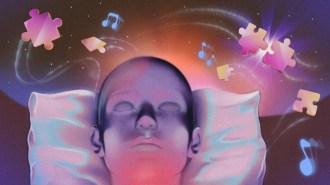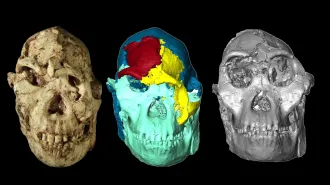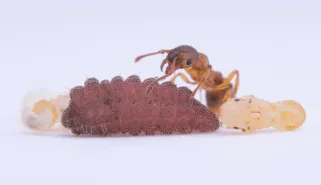A naturally occurring genetic variant may predict who will do well after a stroke and who won’t.
People who have two copies of a particular version of the Tp53 gene have a poor prognosis after stroke and brain hemorrhages, researchers in Spain report online February 28 in the Journal of Experimental Medicine. The difference between the two versions of the gene amounts to one small change: swapping proline out for arginine as the 72nd link in a chain of amino acids that make up a protein called p53.
The arginine-containing variant of p53 had previously been shown to help protect against cancer by increasing apoptosis, a cell suicide program that gets rid of damaged cells before they can turn nasty. Brain cells can also undergo apoptosis after a stroke, but there it’s a bad thing, leading to more widespread damage.
Angeles Almeida, a molecular biologist at the University Hospital of Salamanca, and her colleagues wanted to know if the variant works as vigorously in the brain as in cancer cells, so they tested nerve cells that make either the arginine variant or the proline version.
“We saw that the difference was huge,” Almeida says. Cells with the arginine version of p53 had four times greater capacity to undergo apoptosis than cells with the proline variant did.
And that molecular difference carries over into consequences for the whole brain. The researchers tested the DNA of stroke and brain hemorrhage victims to see if the version of p53 the people carried could affect their prognosis. The variant did not affect the chance of having a stroke or brain hemorrhage, but did correlate with how well patients had recovered three months after the brain injuries, the team found.
Of people who had a poor prognosis after a stroke, about 81 percent carried two copies of the arginine variant. About 91.5 percent of people with a poor outcome after a hemorrhage had the arginine variant. None of the people with two copies of the proline variant had bad outcomes after either stroke or hemorrhage. People with one copy of each variant tended to have good prognosis after either type of brain injury.
“Their epidemiological data is really quite convincing,” says David Johnson, a cancer researcher at the University of Texas M.D. Anderson Cancer Center in Smithville.
Not everyone agrees. “We know already that there’s no way this is going to hold up in African Americans,” says Maureen Murphy, a cancer biologist at the Fox Chase Cancer Center in Philadelphia. African Americans tend to have the proline version of p53, but also have high rates of stroke, often with very poor outcomes, she says. It will be important to repeat the study in other ethnic groups to determine the variants are good predictors of stroke outcome for everyone.
It’s also not clear whether the finding will have any effect on how doctors treat stroke patients, says Mira Katan, a neurologist at Columbia University. Usually it takes too long to do genetic testing in an emergency room, so doctors will likely continue to treat people using standard guidelines, she says.
Almeida agrees that the results may not immediately improve patient care, but says that the findings indicate that controlling apoptosis could one day make a big difference in how people fare after a stroke.





